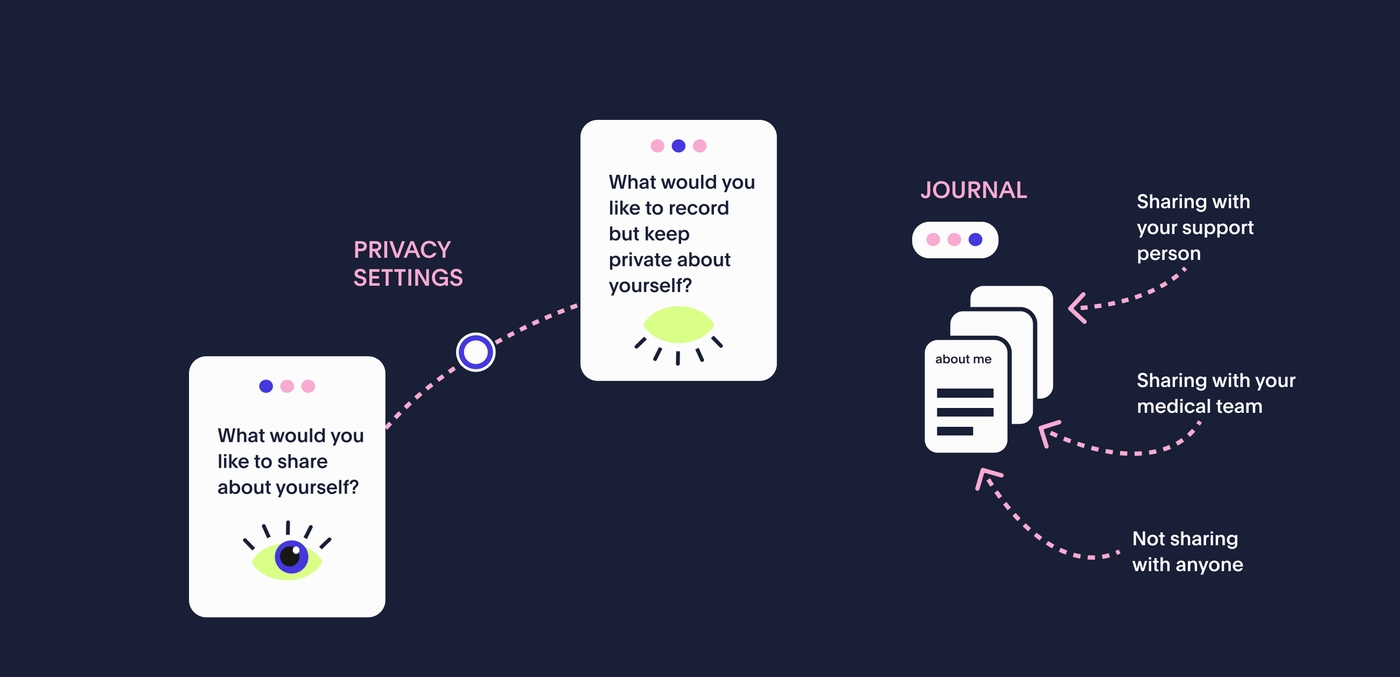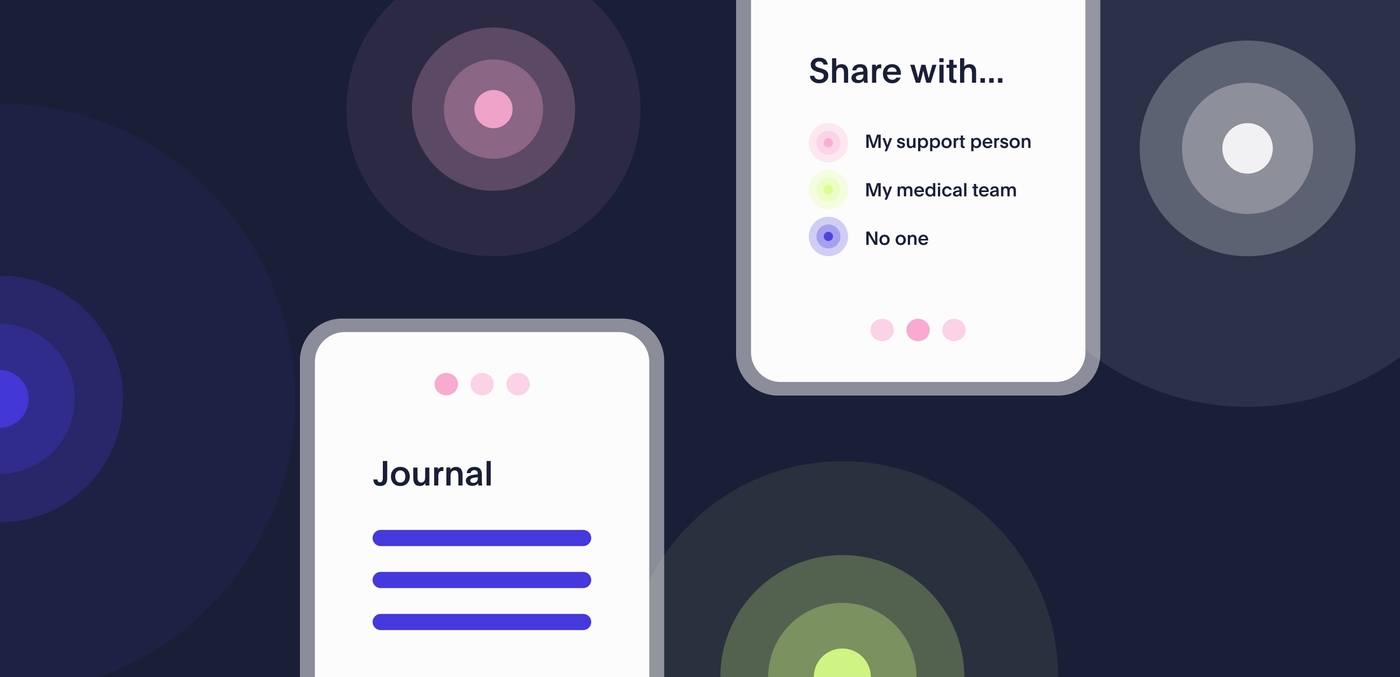Content warning
This article describes mental health challenges, a broken mental health system and potential triggers for people facing or supporting others through mental health challenges.
We encourage anyone who is affected by this article to reach out for support. If you’re unsure where to go or who to reach out to, we recommend reaching out to Lifeline 24/7 crisis helpline 13 11 14 or any one of the following services linked here.
Introduction to Research and Development at Portable
At Portable, we are underway on an 18-month, independent deep-dive into the mental health sector. We’ve just completed our second sprint. Our first led us to develop a set of mental health design principles, which guided us through this sprint as we reviewed the Royal Commission into Victoria’s Mental Health System report. This research is self-initiated, it is not attached to any project or client. It is our independent deep-dive into the mental health sector, aligning to our company mission.
Our mission at Portable is to seek out areas of social need and policy failure and make transformational change using research, design and technology. We work in a series of impact areas including mental health, justice and the public sector.
Royal Commission into Mental Health
The Royal Commission report launched in August 2021. It sets out 65 Recommendations and an ambitious reform agenda that will (hopefully) positively impact the lives of everyone living in Victoria.
The future described in the report champions a community-based model of care. While the Commission recognises the integral role of medical service providers in the future mental health system, this report acknowledges the role communities of place, communities of interest and communities of practice play in supporting people’s wellbeing. According to the report, this might look like ‘50-60 new Local Mental Health and Wellbeing Services providing treatment, care and support, for adults and older adults’ across Victoria. They are acknowledging the importance of having non-medical, culturally safe mental health care service providers be available for all Victorians alongside medical mental health services.
Our original research and development brief was to learn how we might set up tools to enable people to navigate the new mental health system. Initially, we wanted to understand the role data will play in the future, and how data insights could inform decision making across the new service model and explore ways we might develop a data dashboard.
Through a two week research and development sprint, a cross-disciplinary team consisting of a business analyst, strategic designers, experience designer, technologist, producer and senior leadership representation at Portable collaborated to:
- Review the 5 volume Royal Commission report; especially focused on Volume 5: Transforming the system—innovation and implementation to understand how the system fails the people in it and what to consider as we redesign it.
- Map the Personal stories and case studies; listening to what has been shared by people consulted throughout the Royal commission report research, helped us find deeper truths that inspire opportunities for change.
- Share learnings from Portable projects focused on the mental health sector, privacy and informed consent as well as equitable strengths-based conversations; Orygen #Chatsafe, Lately, Legal Aid NSW and amica.
- Compare data insights from mental health care systems nationally and internationally.
- Unpack the existing data management system used in today’s mental health care system (Client Management Interface/Operational Data Store, or CMI/ODS, a statewide mental health patient information system that is managed by the Department of Health and Human Services.)
- Lean into our experience on projects where we design with data to develop data insights and data governance material, such as with Bushfire Recovery Victoria and Department of Environment, Land, Water and Planning Water Information Management System.
Placing people at the centre
Our research brought us back to remember what people need as they move through the mental health care system. While the Commissions’ reports expertly lay out recommendations inspiring digital solutions, we wanted to ensure that all future solutions acknowledge people’s diversity, respect people’s rights and encourage people to express their integrity.
As systems, product and service designers, it’s important to always remember that all experience is subjective, and no two people might experience the same event in the same way. So we decided to take a step back from our original brief to explore a mental health data dashboard to instead look at how we think about data in the mental health sector as a whole.
Exploring the experience of ‘Supporters’
Working within the constraints of a two week sprint, we chose to focus our concepts on people who support others through mental health challenges. People who are not medical professionals and are unlikely to be familiar with mental health care services. We refer to these people as ‘supporters’ throughout the article.
Embodying human-centred design, our mental health design principles, design ethics, trauma-informed design and a passion for data ethics we wanted to create concepts that respect intersectionality, make room for people’s subjective experiences (principle 3: Make space for every identity) and encourage users to have agency and control over their data and health outcomes (principle 1: Give people control and independence). So that the concepts put people’s needs first, and technology acts in service of their needs and experiences.
Exploring mental health conversations about support and consent
Our research has led us to explore two ways in which the future mental health care system could take a human-centred and trauma informed approach when realising Recommendation 61: Sharing mental health and wellbeing information.
To learn more about what we have been learning during our 18 month deep dive into the Mental health care sector, check out our previous articles:
- Design principles for the mental health sector
- Introducing our deep dive into the Royal Commission into Victoria’s Mental Health System
- 3 principles of a human-centred mental health system
While we will introduce each concept separately in two articles, it is easy to imagine how they might be two features or ideas explored in the same system, suite of digital tools or reinvented to inform and shape new products. These concepts are the starting point. They need to be tested with people who will be using the future system, iterated upon, validated and reshaped.
Showing what informed data consent looks like so that people are empowered to understand data privacy and the role their data can play when accessing mental health care services

We believe individuals should have agency and control over their personal data, by showing people what is or is not shared with others throughout the system. Through the setup of nuanced data sharing controls, we hope to encourage people to decide how they want their data to help them achieve their health and wellbeing outcomes.
In the image above, we explore how future digital tools in the new mental health care system might set up ‘data sharing’ controls in people’s profile accounts so that they can choose how they want their personal data to shape their experience.
The Victorian Mental Health Care Act 2014 describes how informed consent shapes the experience of someone seeking treatment. Our understanding is to use ‘informed consent’ as a design principle so that people are enabled to have agency and control over their treatment outcomes through every interaction within the system, not solely when seeking treatment. This reflects principle 1 Give people control and independence from our mental health design principles.
This led us to explore how we might use transparent privacy settings to show users what is happening in the system as a result of their choices, so that they can make informed decisions when choosing to withhold information or share data across the system. We considered other apps that have nuanced privacy and sharing permissions that create safe environments for users. Strava’s privacy settings are one such nuanced approach.
We hope to help people make informed decisions about what they will consent to share, want to share or will not consent to share. For example, our concept considers what people are sharing with:
- their supporter so that they know the boundaries they have set with their peers and when, how and why they can expect to feel support from their community.
- their healthcare team so that the system can carry the load of remembering detail so they don’t have to carry it around.
- the system as a whole, so that they understand how the system surfaces services and communities based on their shared preferences.
Respecting people’s right to privacy or potential preferences to ‘try before buying’, our concept considers why users may not want to share data with:
- their supporter in the event of family violence or wanting to set a clear boundary between information shared with a mental health professional versus an informal friendly face.
- their healthcare team in case they prefer not to disclose previous history or relive past trauma or experiences.
- the system as a whole and offer alternatives to ‘try out’ the system as an anonymous user who can still access services without commitment and potential perceptions of investment or judgement.

Things we considered when crafting this concept:
- Recognise people’s individuality, intersectionality and the subjective nature of mental health challenges. We should always embody whole-person care as a design concept.
- Respect people’s right to data privacy. Consider creating anonymous browsing options, so that disagreeing with data sharing does not block people from accessing services.
- Encourage people to build agency and control over their own health and wellbeing outcomes. This should take into consideration how data systems are set up to deliver services to people.
- Connect the concept of informed consent with reality. Users of the system should know how to intervene with the flow of their personal data and information so that they understand how their personal data is used.
- Use strengths-based language and where-possible, consider how designing systems can be guided by strengths-based principles.
- Empower people to influence how their personal data and information can shape their experience.
What’s next?
Our research is far from over. There is a lot of work to be done, learnings to be learned and conversations to hold about the Mental health system in Victoria.
If you or your organisation wants to be part of this conversation, we would be happy to connect, share insights and continue working on these important topics, you can reach out to us at hello@portable.com.au
This research and development work was guided and completed by our cross-disciplinary team:
- Allison Snow, Lead Producer
- Chris Rickard, Lead Technologist
- Greg Corlett, Senior Business Analyst
- Maria Garcia, Senior Experience Designer
- Lucy Boehme, Experience Designer
- India Lock, Strategic Designer
- Aishling Costello, Strategic Designer
- Emily Pearce, Senior Content Strategic Designer
- Andrew Apostola, Co-founder, Portable